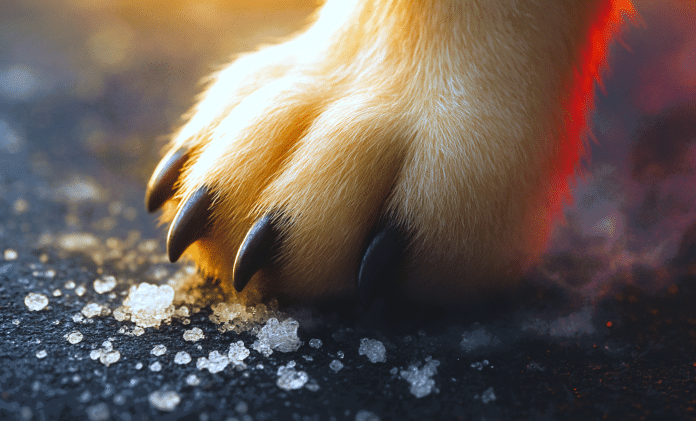Denver, CO – As the first snow and overnight freeze settle across Colorado’s Front Range and mountain corridors, veterinarians are reminding pet owners to take precautions before heading out for winter walks. The road salt and chemical de-icers used to treat highways, driveways, and sidewalks can burn paw pads, irritate skin, and cause toxic reactions if pets lick or ingest them.
Common de-icing products used across Colorado contain sodium chloride, calcium chloride, or magnesium chloride, compounds that melt ice effectively but are harsh on sensitive paws. Even brief exposure can lead to dryness, cracking, or chemical burns. When pets lick their paws afterward, they may swallow these salts, leading to vomiting, diarrhea, excessive thirst, or lethargy. In more severe cases, veterinarians warn, salt poisoning can cause seizures or kidney failure.
Colorado’s unique mix of urban frost and high-elevation snow means that both mountain and city pets are vulnerable. Some de-icers used along major highways and parking areas contain industrial additives or heavy metals, which heighten toxicity risk with repeated exposure throughout the season.
To prevent harm, veterinarians recommend rinsing your dog’s paws with warm water after every walk and drying them thoroughly. Applying a paw balm or wax before heading outdoors can protect the pads, while trimming fur between toes helps prevent ice or salt buildup. Booties can provide an additional safeguard for dogs that tolerate them. Homeowners are urged to use chloride-free, pet-safe ice melts around their property.
With temperatures falling into the 20s and teens across the mountains and a mix of snow and ice expected along the I-25 corridor, veterinarians urge owners to watch for signs of limping, licking, or reluctance to walk—early indicators of irritation or burns from salt exposure.
As winter weather settles across Colorado, experts emphasize that the biggest cold-weather danger to pets isn’t the snow—it’s the chemicals spread to melt it.




